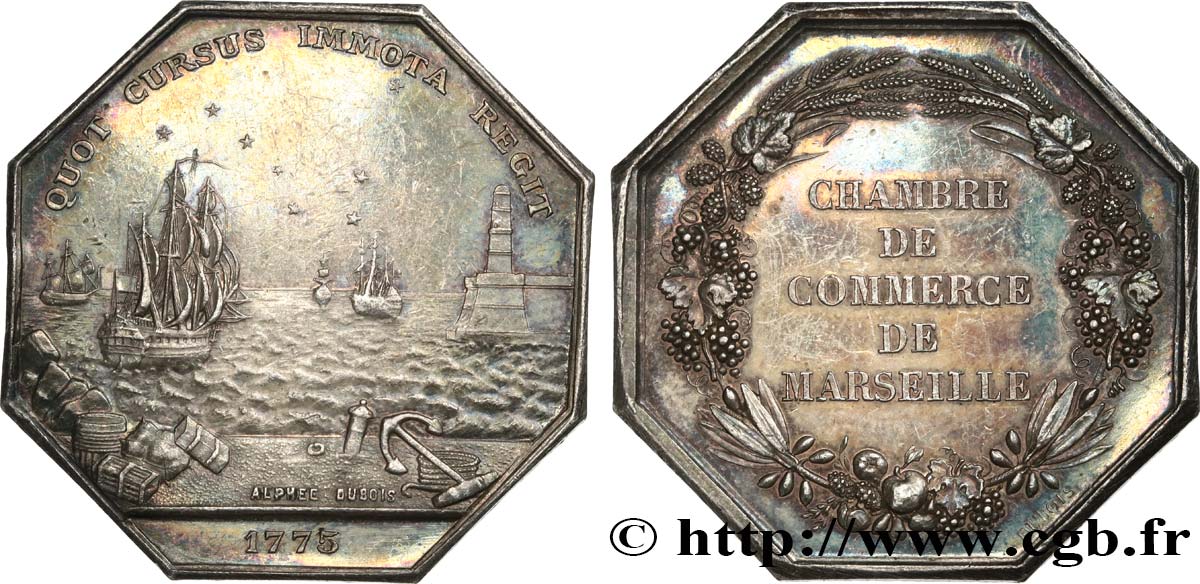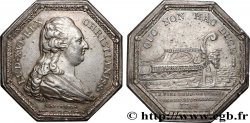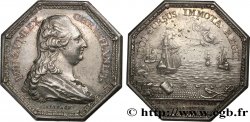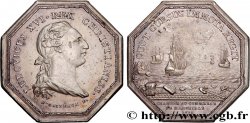fjt_564233 - CHAMBRES DE COMMERCE Chambre de commerce de Marseille 1775
non disponibile.
Articolo venduto sul nostro negozio (2021)
Prezzo : 50.00 €
Articolo venduto sul nostro negozio (2021)
Prezzo : 50.00 €
Tipo : Chambre de commerce de Marseille
Data: 1775
Metallo : argento
Diametro : 34,5 mm
Asse di coniazione : 12 h.
Peso : 19,07 g.
Orlo : lisse
Marchio : corne ARGENT
Diritto
Titolatura diritto : QUOT CURSUS IMMOTA REGIT.
Descrittivo diritto : Bateaux devant le quai du port de Marseille sur lequel sont posés des ballots et une ancre, signature ALPHEE DUBOIS ; à l’exergue : 1775.
Traduzione diritto : (Elle guide tout en restant immobile).
Rovescio
Titolatura rovescio : INSCRIPTION AU CENTRE EN CINQ LIGNES : CHAMBRE/ DE/ COMMERCE/ DE/ MARSEILLE.
Descrittivo rovescio : Couronne composite, signature DUBOIS.
Commento
Semble rare avec cette effigie. La première chambre de commerce fut celle de Marseille créée à la fin du XVIe siècle. Pour Paris, les six corps des marchands et les juges-consuls avaient un rôle similaire à celui d'une chambre de commerce : une association de commerçants réunis pour délibérer sur les intérêts de leur ville ou de leur région et donner leur avis au gouvernement. Colbert les légalise en 1664 en instaurant que chaque place de commerce choisira deux d'entre eux pour les représenter. L'institution ne fut toutefois établie réellement que par l'arrêt du Conseil du 30 août 1701 et de nombreuses chambres de commerce apparaissent au XVIIIe siècle à Lyon, Rouen, Toulouse, Montpellier, Bordeaux, etc.. La plus importante d'entre elles est Marseille qui avait des attributions dans tout le commerce du Levant et était du département des Affaires étrangères, les autres relevaient du Contrôle général des Finances. Supprimées par la Constituante en 1791, les chambres de commerce sont rétablies sous le Consulat. Depuis 1832, leur recrutement se fait par élections, elles sont devenues chambres de commerce et d'industrie depuis 1898, regroupées en 21 chambres régionales.
Seems rare with this effigy. The first chamber of commerce was that of Marseille, created at the end of the 16th century.. For Paris, the six merchant corps and the consul judges had a role similar to that of a chamber of commerce: an association of merchants gathered to deliberate on the interests of their city or region and give their opinion to the government.. Colbert legalized them in 1664 by establishing that each trading place would choose two of them to represent them.. The institution was, however, only actually established by the Council's decree of 30 August 1701 and numerous chambers of commerce appeared in the 18th century in Lyon, Rouen, Toulouse, Montpellier, Bordeaux, etc.. . The most important of these was Marseille, which had responsibilities in all Levantine trade and was part of the Department of Foreign Affairs; the others came under the General Control of Finance.. Abolished by the Constituent Assembly in 1791, the chambers of commerce were reestablished under the Consulate. Since 1832, their recruitment has been done by elections, they have become chambers of commerce and industry since 1898, grouped into 21 regional chambers
Seems rare with this effigy. The first chamber of commerce was that of Marseille, created at the end of the 16th century.. For Paris, the six merchant corps and the consul judges had a role similar to that of a chamber of commerce: an association of merchants gathered to deliberate on the interests of their city or region and give their opinion to the government.. Colbert legalized them in 1664 by establishing that each trading place would choose two of them to represent them.. The institution was, however, only actually established by the Council's decree of 30 August 1701 and numerous chambers of commerce appeared in the 18th century in Lyon, Rouen, Toulouse, Montpellier, Bordeaux, etc.. . The most important of these was Marseille, which had responsibilities in all Levantine trade and was part of the Department of Foreign Affairs; the others came under the General Control of Finance.. Abolished by the Constituent Assembly in 1791, the chambers of commerce were reestablished under the Consulate. Since 1832, their recruitment has been done by elections, they have become chambers of commerce and industry since 1898, grouped into 21 regional chambers








 Segnalare un errore
Segnalare un errore Stampate la pagina
Stampate la pagina Condividi mia selezione
Condividi mia selezione Fai una domanda
Fai una domanda Consegnare / vendere
Consegnare / vendere
 Descrittivo
Descrittivo















